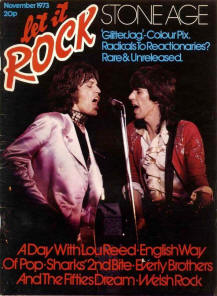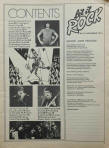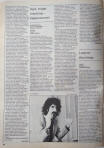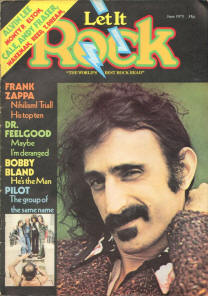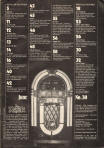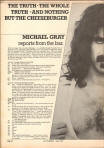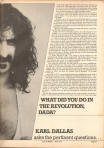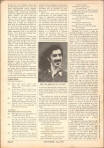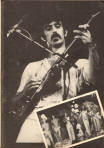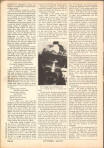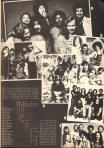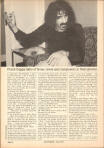Let It Rock
What's been odd throughout is that Zappa's ambiguous relationship with rock has been unnecessary and basically false. Insult comics are parasitic on other people's work, Zappa is a brilliant guitarist and the best arranger in rock. His one album that was totally devoted to rock without sneers, Hot Rats, was a masterpiece – probably the best progressive rock album ever, certainly the most influential. And, even odder, to balance his distaste for mass culture, Zappa has a genuine love and affection for the vulgar, for what the people themselves make of the pap they're fed. Reuben And The Jets is still the best tribute to the late fifties punk and somewhere in Zappa's heart there's a corner beating in sympathy with the masses, even when they're hippies. (read more)
Source: eBay
1975 June
No. 36
(1)
The truth the
whole truth and nothing but the cheeseburger
Michael Gray reports from the bar, pp 32, 34
(2) What
did you do in the revolution, dada?
Karl Dallas asks the pertinent questions, pp 33, 34, 36
(3) Frank Zappa
talks of faves, raves and composers in their graves
Giovanni Dadomo collected Zappa's thoughts during a recent interview,
p 38
(2) Dadaism, one of the first and most interesting flights from reason which greeted Western civilisation's discovery that the eternal truths of Euclid and Newton had been overthrown, was announced to the Parisian public on January 23, 1920, by Tristan Tzara, who read aloud a newspaper article while an electric bell rang so loud that no one could hear what he said.
"This was very badly received by the public, who became exasperated, and shouted," reported Tzara later.
Zappa would have loved that response, not only because his own attitude to art is rooted in the Parisian scene of between the wars – hence his continual espousal of the French-born composer, Edgar Varèse who, though he has lived in the USA since the beginning of World War I, as a pupil of d'Indy and Roussel is still very much a Frenchman of that era – but also because he used assault on his audience as a means of clearing away the dead wood of accepted attitudes and forcing it to think.
For though Dadaism appeared to the Twenties as nonsense, to us the point is only too clear: if the medium is nonsense then that is the message. As Zappa himself told Lorraine Alterman in 1966: "We are systematically trying to do away with the creative roadblocks that our helpful American educational system has installed to make sure nothing creative leaks through to mass audiences. We're here to help them. Them being the non-thinking plastic robot targets of Madison Avenue nonsense, poverty programmes and all that red, white and blue rigmarole." (read more)
